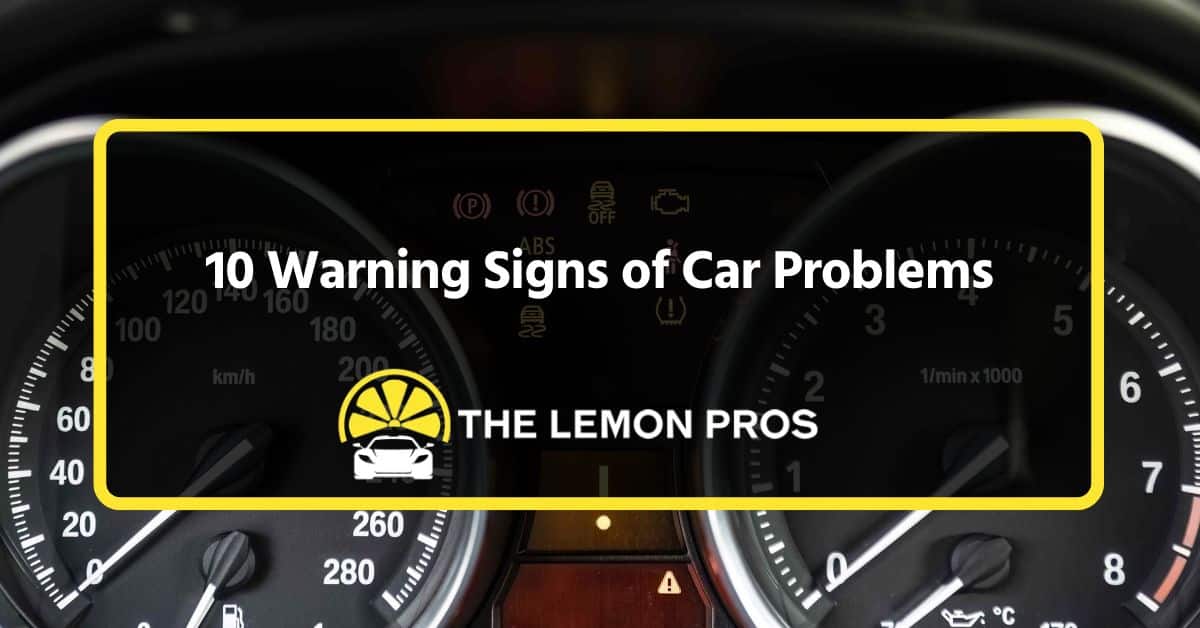
Top 20 Most Common Car Problems
Most common car problems begin as something minor, but regular maintenance can prevent them from developing into major, expensive issues. Depending on the problem, you could face issues with performance, fuel economy and safety.
Some preventable issues include the Check Engine Light, a dead car battery and brake problems. Drivers also tend to face starting troubles, slipping transmission and difficulty with the ride. When the defects become substantial and can’t be repaired, it may be time to file a Lemon Law claim.
The Lemon Pros are skilled at navigating negotiations with car manufacturers and dealers. With a practice area centered on California Lemon Law, our team of attorneys can get you the compensation you deserve. Contact us today for a free consultation to see what you may be owed.
In this guide, we discuss various problems that car owners may encounter. We also break down whether you should consider a Lemon Law claim if the local auto repair shop can’t fix your car.
Table Of Contents
- What Are the Most Common Car Problems?
- 1. Check Engine Light Keeps Coming On
- 2. Engine Won’t Start
- 3. Low Fluid Levels
- 4. Brake Issues
- 5. Car Pulls to One Side When Driving
- 6. Automatic Transmission Slipping or Shifting Roughly
- 7. Overheating Engine
- 8. Dashboard Warning Lights Won’t Turn Off
- 9. Flat Tires or Blowouts
- 10. Shaking or Vibrating While Driving
- 11. Strange Smells Inside or Around Your Car
- 12. Fluid Leaks Under the Car
- 13. Car Won’t Accelerate Properly
- 14. Knocking or Ticking Noises from the Engine
- 15. Poor Fuel Economy
- 16. Steering Feels Loose or Unresponsive
- 17. Air Conditioning Not Blowing Cold Air
- 18. Headlight or Taillight Failure (Electrical Problems)
- 19. Car Stalls While Driving
- 20. Exhaust Smoke
- What if These Common Car Issues Keep Coming Back?
- Think You’re Stuck with a Defective Vehicle?
- FAQs
What Are the Most Common Car Problems?
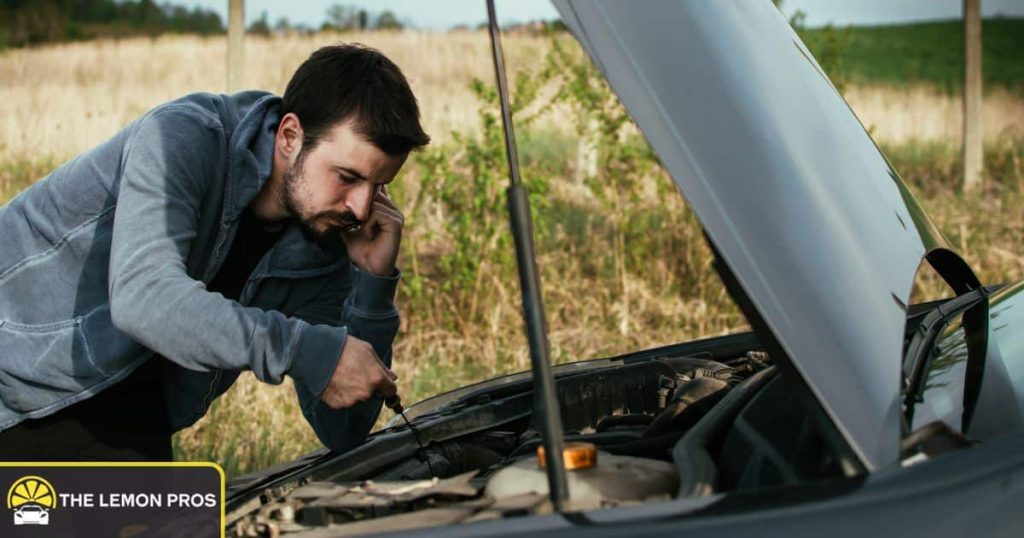
While anything could go wrong with today’s modern cars, this is a list of what most commonly fails. Some of these issues can be prevented with proper maintenance, so it’s important to follow all manufacturer-recommended service schedules.
1. Check Engine Light Keeps Coming On
The Check Engine Light is probably the most well-known of all the car warning lights. It tells you when there’s a fault with the vehicle that needs to be checked out. In many cases, the light is alerting you to faulty O2 sensors, a loose gas cap, a misfire that requires a tune-up, or other simple faults.
However, when the Check Engine Light starts flashing, you need to stop driving. The flashing signal indicates that a serious issue is occurring and damage could follow if you don’t pull over.
To repair the Check Engine Light, you need to find out what’s causing the fault and fix it. You can plug an OBDII scanner into the car to read the manufacturer’s trouble codes. These help to decipher the problem.
2. Engine Won’t Start
One of the most common car problems is when the engine won’t start. While it may seem like an issue with the engine itself, it usually isn’t. If there’s no response from the motor or just clicking when you turn the key, you may have a dead battery or a bad starter motor. Starting issues can also be caused by a failing ignition system.
Test the battery with a multimeter to see if it is holding a charge. If the battery is new but isn’t charging, you may need to check the alternator instead. Otherwise, you can replace the starter or other faulty components after performing a complete diagnosis.
3. Low Fluid Levels
Low fluid levels happen when there’s not enough of the essential liquids needed to support the system. Your car needs engine oil, coolant, automatic transmission fluid, brake fluid, power steering fluid and windshield washer fluid.
Some of the fluids keep the systems cool and lubricated, ensuring that the car is safe to drive. When they get low, you may notice warning lights on the dashboard, performance issues, overheating or strange noises, depending on the system.
To diagnose the problem, you need to check the fluid level. Oil level is checked with a dipstick, as is most transmission systems. Brake fluid and coolant may be checked with reservoir markings. You also need to check for fluid leaks. Put a cardboard under the car to see if anything is dripping out. The fluids can be identified by color, such as brown/black for oil, lighter for leaking brake fluid or red for transmission fluid.
Once you ensure there are no leaks, you want to top off the system. Make sure you use the right fluid for your car, as determined by the manufacturer's specs.
4. Brake Issues
Brake issues quickly turn into a serious safety concern if left unchecked. If you hear noise while braking or experience reduced stopping power, you need to have the brakes checked immediately. Worn brake pads, warped rotors and stuck calipers are common, especially if the brake system hasn’t been maintained.
Have the pads and rotors replaced if they are worn and ask for a full brake system inspection. During this inspection, the brake fluid will be checked and all of the lines will be examined for wear or leaks.
5. Car Pulls to One Side When Driving
When the car veers to the left or right without moving the steering wheel, there’s usually an issue with the tires or alignment. Although the problem could also be caused by brake drag from a stuck caliper.
Check the tire inflation and adjust if necessary. If that all checks out, you should have the wheel alignment checked by a professional.
6. Automatic Transmission Slipping or Shifting Roughly
Jerky shifting, delayed acceleration and slipping gears can all be due to transmission problems. In some cases, the car may simply have low fluid that needs to be topped off. Otherwise, there could be a solenoid malfunction or internal damage to the transmission.
Check the fluid level and perform a flush if recommended. For more complicated transmission repairs, it’s best to visit a shop that is familiar with your car model.
7. Overheating Engine
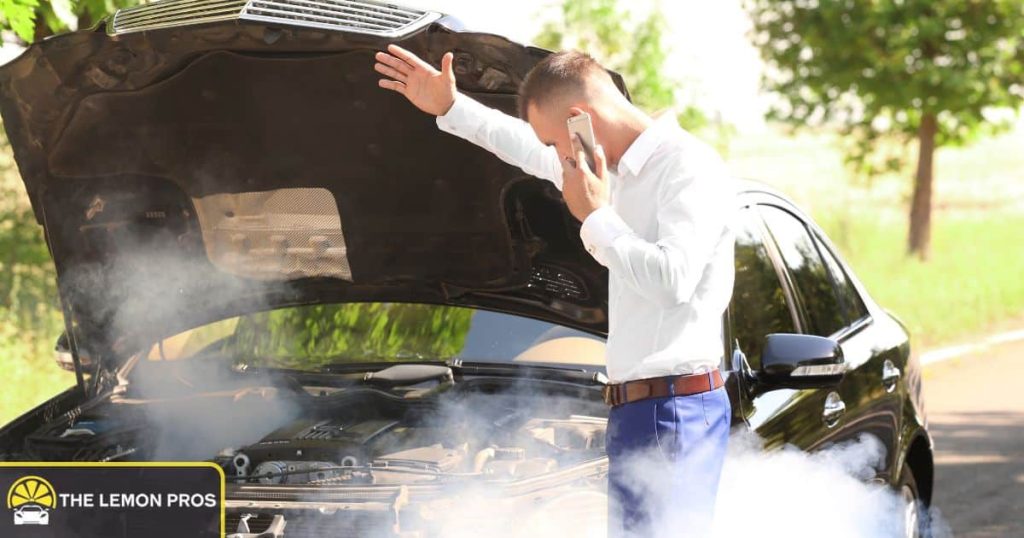
A rising temperature gauge or steam coming from the hood indicates trouble with the cooling system. An overheating engine can be caused by coolant leaks, a bad thermostat or a failed water pump.
You need to refill the coolant and inspect the radiator. It’s also important to check for leaks. Look at the color of the engine oil and see if there’s any milky substance inside the engine. If coolant has leaked into the combustion chamber, you may be dealing with a blown head gasket. This problem can be a big deal and is expensive to fix, but it is a common issue on older models.
8. Dashboard Warning Lights Won’t Turn Off
Today’s car models include warning lights for a variety of systems. You may see an ABS light for the anti-lock braking system, tire pressure lights and one for the airbags. These usually indicate a sensor malfunction or electrical issue.
With a code scanner, you can diagnose the trouble and replace the faulty parts.
9. Flat Tires or Blowouts
When a tire loses air pressure, it creates a safety issue. Underinflation is one of the main reasons for blowouts and is completely preventable with regular pressure checks. The tires may also have worn tread or you may be driving in an area with a lot of road hazards, such as construction sites.
To prevent tire issues, check the pressures often. Also, make sure you keep up with tire maintenance, such as regular rotations and balancing.
10. Shaking or Vibrating While Driving
If the steering wheel or the whole car starts shaking while driving, you should never ignore it. That shaking is a sign of unbalanced tires, a worn-out suspension or warped brake rotors.
Get the tires rotated and balanced to see if that fixes the problem. If the shaking continues, you want a mechanic to check the brakes and suspension.
11. Strange Smells Inside or Around Your Car
You should never notice weird smells in or around your car. If you smell something burning, sweet or musty, the car may be trying to tell you that there’s a fluid leak or mold growing in the air conditioning.
Sniff out the source with your nose to see if you can pinpoint the system it’s coming from. Look under the hood for leaks and underneath for drips. If the smell is coming from the AC, you may need to clean out the vents or replace the cabin air filter.
12. Fluid Leaks Under the Car
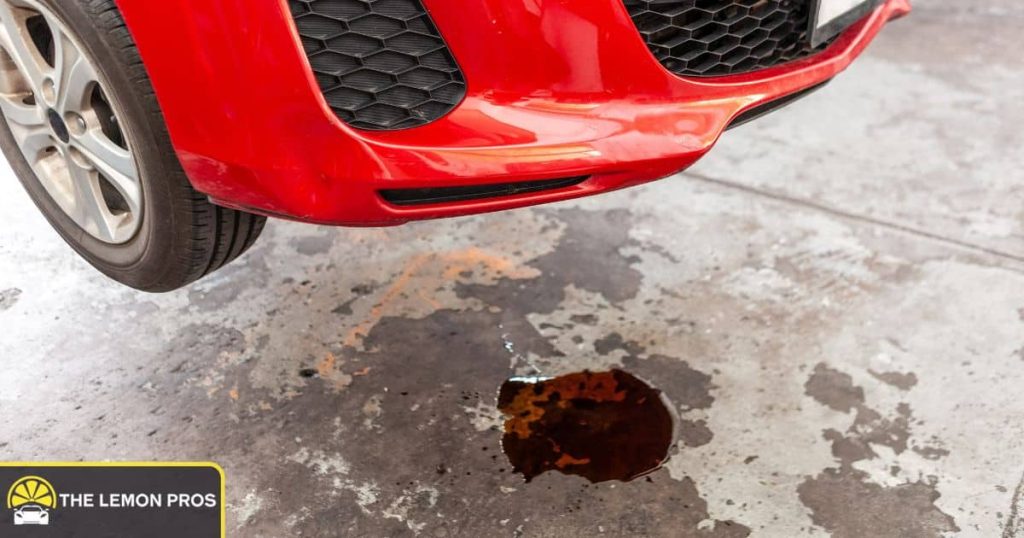
If you notice puddles under your parked car, it could be the result of leaking fluid (transmission, oil, brake, coolant, etc.). However, you want to be careful that you don’t mistake the water dripping from the air conditioner as a leak because this is part of normal operation.
Check all the fluid levels and pinpoint where the leak is coming from. You may need to have a mechanic replace parts to stop the leak at the source.
13. Car Won’t Accelerate Properly
If the car feels sluggish when you step on the gas, there’s definitely a problem. Delayed acceleration can be caused by a dirty throttle body, clogged fuel injectors or a malfunction with the fuel system.
Start by replacing the engine air filter if it’s time. You can also try a fuel system cleaner. If those options don’t help, you may need to have the throttle body replaced or have a mechanic look at the injectors.
14. Knocking or Ticking Noises from the Engine
No one ever wants to hear ticking or knocking from the engine, especially when first starting it up. At best, it could be that there’s a low fluid level or a dirty oil filter. On the flip side, there could be valve issues or worn lifters, which may require a complex repair or an engine replacement.
Topping off the oil or changing the filter doesn’t take long. How long does it take for a dealership to replace the engine? Sadly, this isn’t just one of the most expensive repairs, but also the most time-consuming, with many dealerships taking weeks to put in a new engine.
15. Poor Fuel Economy
Any number of mechanical and electrical system failures can lead to fuel economy drops. You may be facing a dirty air filter, O2 sensor failure or something as simple as underinflated tires.
Perform a complete tune-up on the car to see if it runs better. Remember to check the tire pressures and replace the necessary filters. Otherwise, have a mechanic check the sensors and run a full diagnostic evaluation on the car.
16. Steering Feels Loose or Unresponsive
If you notice delayed or wobbly steering, the system may have low power steering fluid. It could be something more severe, such as worn tie rods, a bad steering rack or a failing power steering pump.
Have a mechanic inspect the entire steering system to determine the cause. It may just require more fluid or a part may need to be replaced.
17. Air Conditioning Not Blowing Cold Air
If your A/C is blowing warm air instead of keeping you cool, it’s usually a sign that something’s up. Whether it’s blowing hot all the time or just can’t stay consistently cold, that’s your cue to have it checked.
The most common fix is a simple refrigerant recharge. But if that doesn’t do the trick, you might be dealing with a broken compressor or a clogged condenser. Either way, getting it inspected early can save you from sweating it out later, especially in summer.
18. Headlight or Taillight Failure (Electrical Problems)
If your headlights or taillights keep going out, even after you replace the bulb, there’s probably more going on than just bad luck. Repeated light failure can be caused by electrical problems, moisture getting into the housing or loose connections.
Replace the bulb and check the socket for corrosion or moisture. If that doesn’t solve it, you might need to inspect the wiring or have a mechanic test the electrical system. It’s a small issue that can lead to big safety (and legal) problems if left unchecked.
19. Car Stalls While Driving
If your car suddenly stalls while you’re driving, that’s more than just annoying. It’s also a serious safety risk. Random engine shut-offs can point to problems with your fuel pump, faulty sensors or issues in the ignition system.
To figure it out, a mechanic can hook up a scan tool to check for trouble codes. From there, the fix could be anything from replacing a bad sensor to repairing the fuel or ignition system.
20. Exhaust Smoke
When there’s visible smoke coming from the tailpipe, you know a system isn’t working as it should. Blue smoke often means the engine is burning oil, while white smoke could indicate a coolant leak or a blown head gasket. Black smoke reveals that an excessive amount of fuel is being used.
Diagnose the condition based on what color smoke is coming from the exhaust. From there, a mechanic may need to replace seals, gaskets or other components.
What if These Common Car Issues Keep Coming Back?
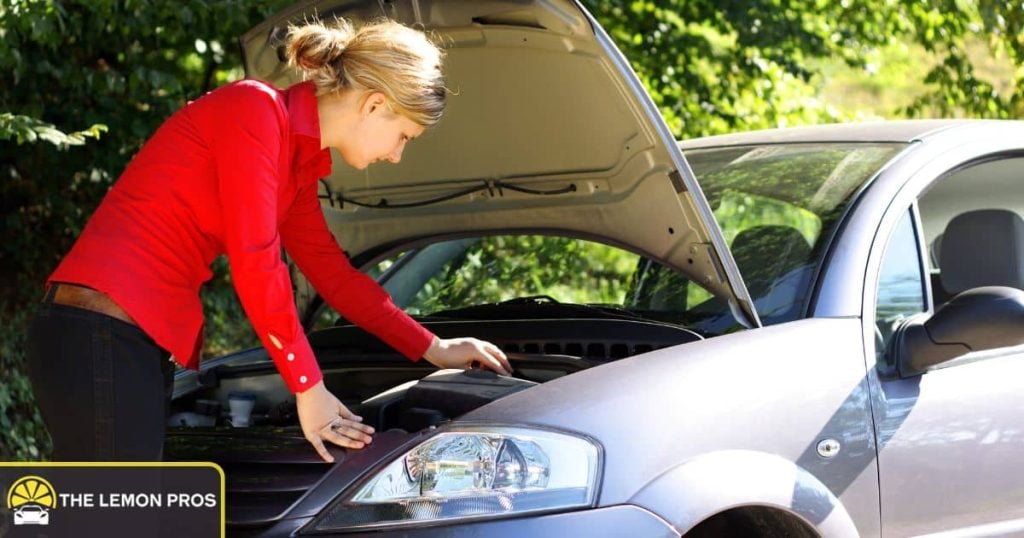
Newer cars shouldn’t continue to suffer from the same malfunction time after time. In California, new cars are covered by the Song-Beverly Consumer Warranty Act, otherwise known as the Lemon Law. To ensure you do everything on your end to protect your rights, follow this list of tips:
- Keep detailed repair records: Make sure you record every time the car is in the shop and the result.
- Take the car to an authorized dealership for repair: You want to take the car back to the same dealership you purchased it from or another recommended by the manufacturer.
- Read your warranty paperwork: Ensure that the repair is covered under the car’s warranty.
- Consider getting a second opinion: This should only be done under the direction of your attorney.
When problems persist after multiple repair attempts, it’s time to consult a Lemon Law attorney. You may qualify for a refund, replacement or cash settlement. How does the Lemon Law work? Your lawyer can review your rights and explain what you are entitled to.
The Lemon Pros have won millions in settlements for clients just like you. Contact us today for a free consultation.
Do You Qualify for California Lemon Law Protection?
Is your car a lemon? Here’s a brief checklist to verify eligibility:
The factory car warranty must be in place. Problems are eligible if they begin within the first 18,000 miles or 18 months while covered under the manufacturer’s warranty. A car warranty lawyer can help you decipher the various types of warranties and your coverage level.
Multiple repair attempts have been unsuccessful. You are required to allow a minimum of four repair attempts in most cases. However, only two are necessary if you are dealing with a serious safety issue.
The defect must substantially impair the use, value or safety of the vehicle. Because of the vagueness of this requirement, most complaints are considered lemons. Potential issues could include a minor electrical concern to a major engine failure.
The car has been in the shop for more than thirty days per complaint. The dealership cannot hold your car for more than a month for a repair.
Think You’re Stuck with a Defective Vehicle?
Whether you are dealing with repeated faulty spark plugs or a catalytic converter that continues to go bad, you may be able to get compensation. While it’s important to keep up with regular oil changes and other maintenance, you have no control over whether or not you are left with a lemon vehicle. By being proactive, you can secure your rights and get compensation.
The Lemon Pros are ready to help with your case. As the best Lemon Law attorney in California, we are taking care of clients every day who have varying car problems. Contact us today for your free case evaluation.
FAQs
What Is the Most Common Problem in Cars?
Most commonly, the Check Engine Light comes on in a car, but there are many reasons why this happens. If you are performing maintenance regularly, you have less of a chance of this occurring.
What Is the Most Common Car Repair?
Car maintenance is what is performed most often at service centers. From a repair standpoint, cars routinely need brake service. By performing maintenance and repairs as soon as they are needed, you prevent larger problems down the road, ensuring your safety and saving you money.
What Part of a Car Fails the Most?
Car batteries are likely to fail most often. Many cars need a new battery every three to five years, depending on the condition. A weak battery can lead to a roadside assistance call or leave you stranded, so it’s best to replace it at the first sign of failure.
Are the Most Common Car Problems Covered by Warranty?
Some of the most common car problems may be covered by your manufacturer’s or extended warranty, especially if they involve defects in parts or workmanship. However, wear-and-tear issues like brake pads or tires are typically not included.



